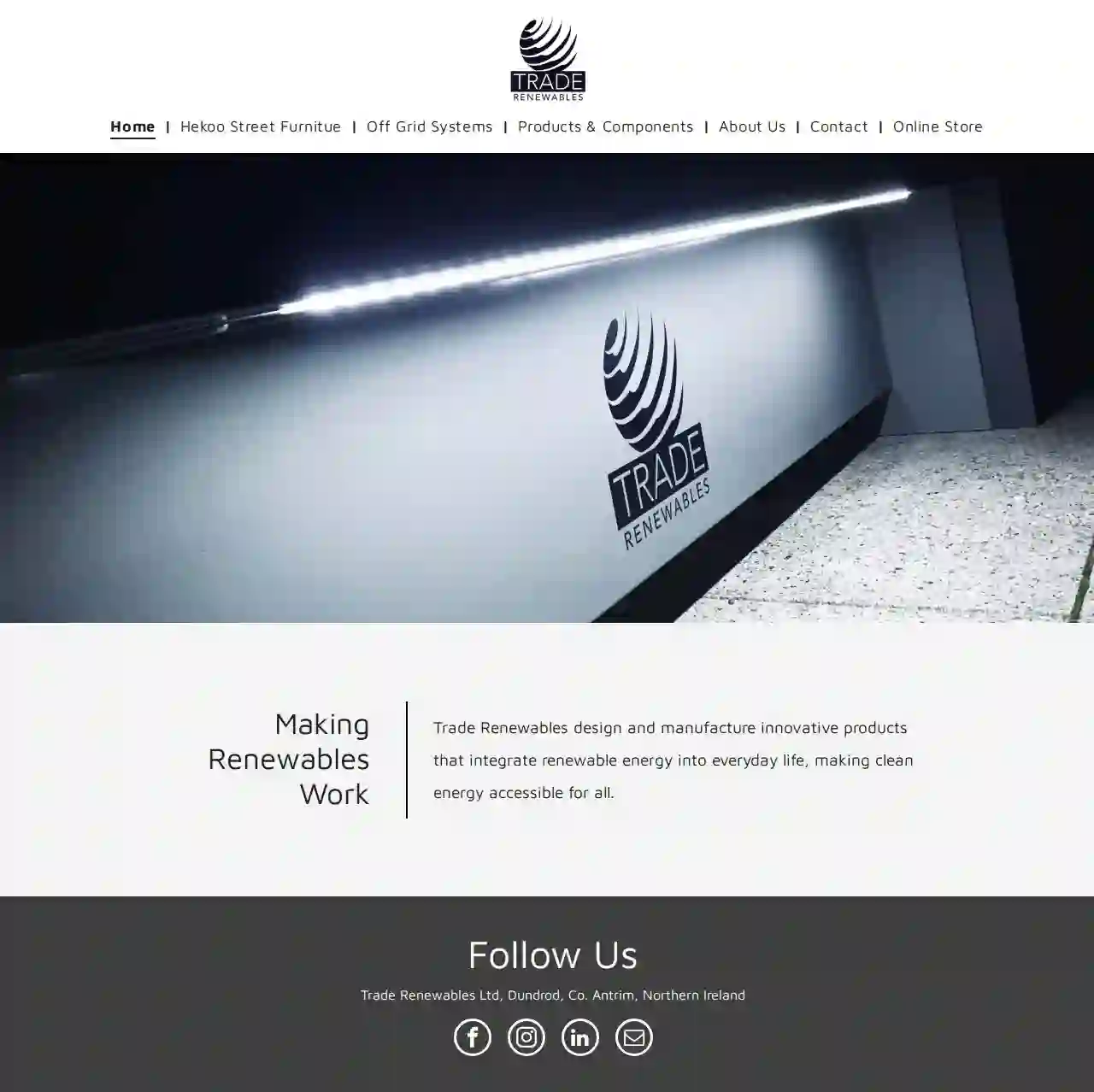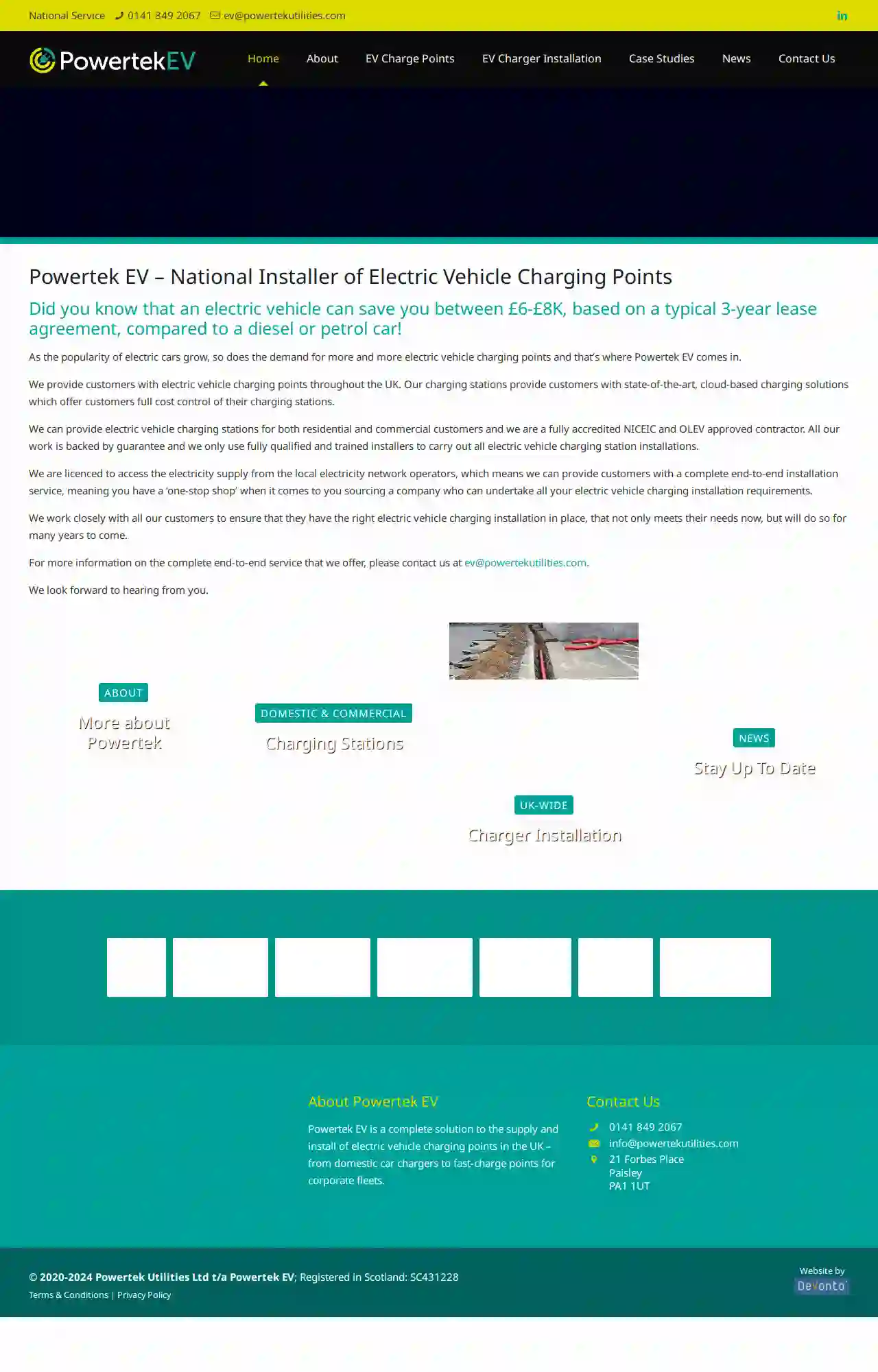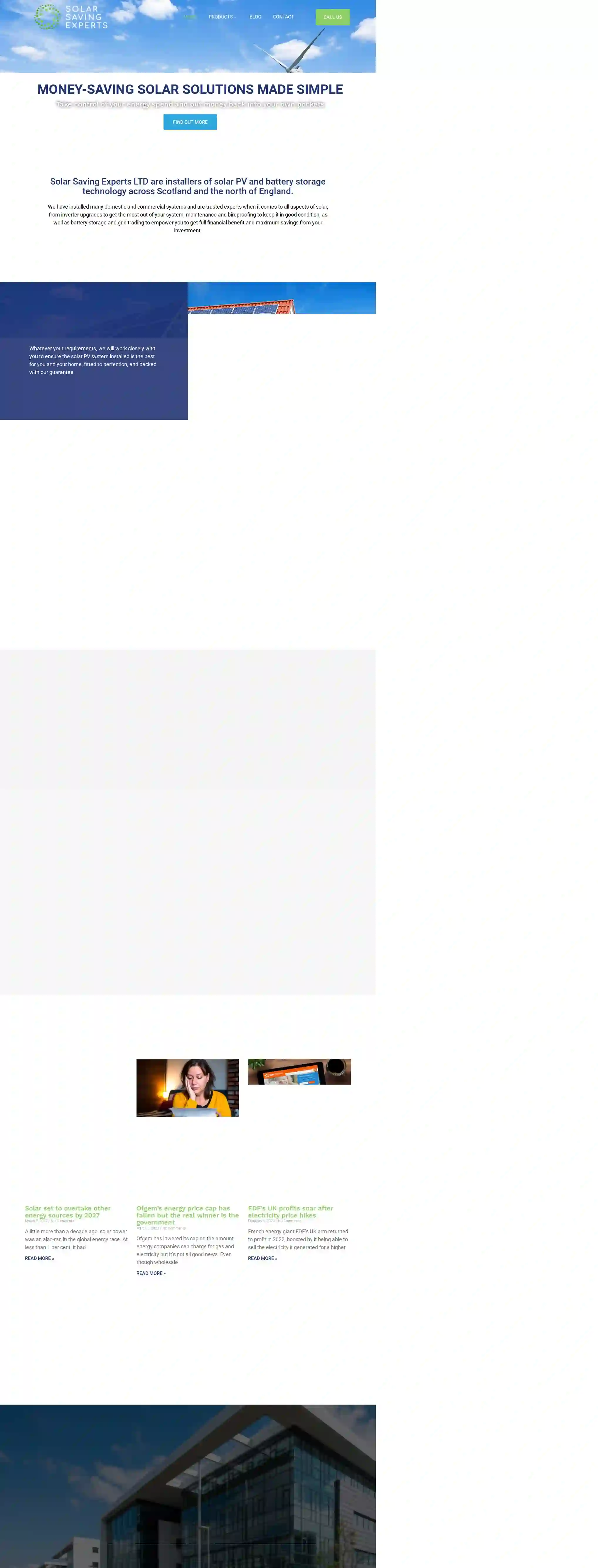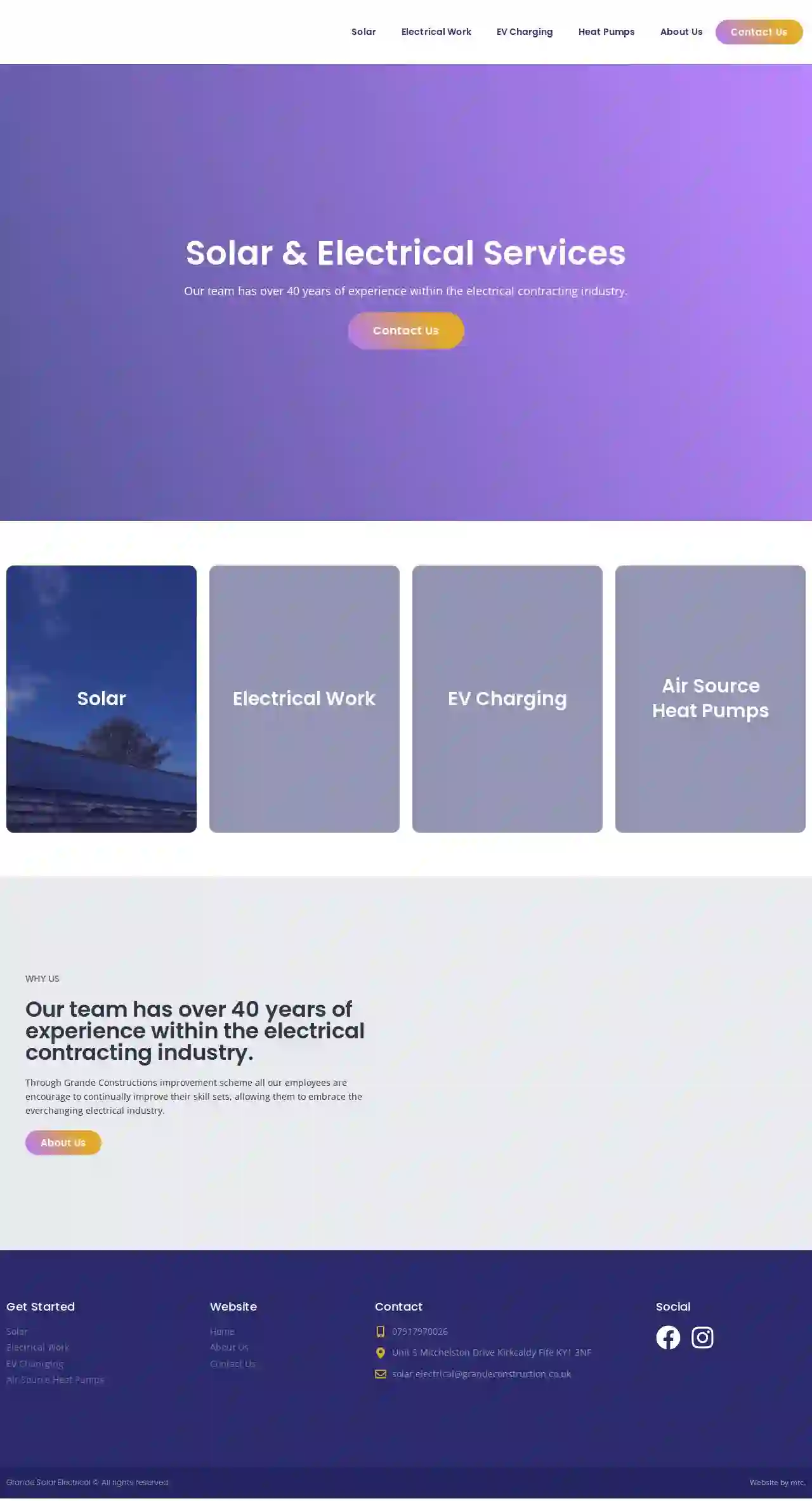Solar Installers Hunters Quay
Find top Solar Company in Hunters Quay
Receive 3 FREE Solar Company quotes for your project today! Compare profiles, reviews, accreditations, portfolio, etc... and choose the best offer.

Trade Renewables
Dundrod, 4 Cochranstown Road, BT29 4JF, GBTrade Renewables design and manufacture innovative products that integrate renewable energy into everyday life, making clean energy accessible for all.
- Services
- Why Us?
- Gallery
Get Quote
Solar Boost Ltd
55 reviews135 Skipton Road, Skipton, BD21 3BG, GBStart Your Solar Journey Today.We provide homes & businesses with green energy across the nation with our expert renewable energy team. Explore our Systems What we offer Solar System InstallationHarness the sun's power with our bespoke Solar solutions.LEARN MORE Solar System UpgradesExpand your solar potential and maximise your energy savings.LEARN MORE Electric Vehicle ChargersWe install cost-effective and convenient electric vehicle chargers.LEARN MORE SOLAR BENEFITSWhy should you switch to solar? Save on your energy billsThe energy generated from your solar system helps power your home or business, reducing the amount of electricity used. This can result in significant savings on energy bills over time. Slash your carbon footprintSolar energy is renewable, meaning it comes from a natural source that is constantly replenished. Solar power does not produce any emissions, pollutants or greenhouse gases, which makes it environmentally friendly. Sell back to the gridOffset your installation costs and electricity bills by selling back surplus electricity to the grid. The energy generated from your system helps power your home or business, reducing the amount of electricity used.Some energy suppliers allow users to top up their batteries during off peak hours such as 2am until 5am and then power their homes from the battery, selling any surplus during peak hours at a higher rate. Making money by selling back to the grid during peak times. Increase your property valueNot only does going solar improve a home's energy efficiency, it also makes the property more attractive to buyers who are looking to purchase an energy-efficient home. Afterall, who doesn’t like buying a property where the electricity bills have been massively reduced due to a solar panel array on the roof. According to research conducted by Admiral, solar panels can add up to an average of 25% onto the value of a home and solar panels are the best green investment. You can read about Admiral research here:Green Appeal - Admiral Why Choose Solar Boost? Reliable and Efficient SolutionsWe source panels and energy storage solutions from top manufacturers, guaranteeing optimal performance and durability for your home. Expert ConsultationWe work with you to assess your energy needs against your property's solar potential to provide you with expert recommendations Seamless InstallationWhether it's a residential, commercial or industrial installation, we prioritise the highest safety standards to ensure efficient installation every time. We are trusted and certified energy installers We are MCS certified MCS certified Installers have undergone a rigorous vetting process to demonstrate that they adhere to our Standards. If your technology is eligible for a government incentive, you will need to be able to provide MCS certification to claim this.Find Solar Boost Ltd on the MCS website (mcscertified.com) We are members of RECC RECC is a leading consumer protection organisation covering the installation of home energy products. The RECC promise is to ensure all consumers are respected, protected and educated on their home improvement journey. Find Solar Boost Ltd on the Renewable Energy Consumer Code (RECC) website. We are registered with NAPIT We are committed to quality, safety and customer care. NAPIT certificated scheme members have demonstrated their competence, they hold the necessary insurances and are compliant with the right processes and procedures.Find Solar Boost Ltd on the NAPIT website of registered microgeneration installers.
- Services
- Why Us?
- Accreditations
- Gallery
Get Quote
Mms Building Services Ltd
3.211 reviews5 Maryfield Crescent, Leslie, KY6 3JT, GBMMS Building Services is a family run business based in Fife that manufacture and construct eco friendly residential homes and commercial office buildings across the region and surrounding areas. Our highly experienced staff has the know-how to guarantee that our clients are completely satisfied with our custom built homes. We build small customized eco friendly homes using renewable energy, specializing in manufacturing small lodge size buildings that can be constructed at our premises. These are then transported to your location where we shall erect and fit out your building. Constructing green buildings is booming and the construction materials used are getting better every year. Our modern eco smart homes that we manufacture are designed and built to your requirements and we believe are affordable and in reach for everyone. Buildings can come with Solar Panels and underfloor heating and heat batteries. We are dedicated to finding the right home renewable energy solutions for the manufactured portable building that becomes your office or residential home. We are focused upon working with a select number of customers to help them build an energy efficient park home or bespoke lodge building.
- Services
- Why Us?
- Gallery
Get Quote
Solar Panels Northern Ireland - Clover Energy Systems
514 reviewsLisburn, GBClover Energy Systems is a leading solar panel installer in Ireland and Northern Ireland. We provide expert advice, guidance, and support to help you make the most of your solar investment and achieve your energy goals. Our systems include solar PV panels, battery storage, battery back-up systems, EV chargers, and hot water diverters which can heat your water with excess energy. We have become one of the leading solar panel companies in Ireland and Northern Ireland, providing expert advice, guidance, and support to help you make the most of your solar investment and achieve your energy goals. Become familiar with the process now! PV Solar Panels NI Clover Energy Systems only use Tier 1 Accredited PV Panels from brands such as; Q-Cells, LG, Trina, JA Solar & Longi. As one of the best solar energy companies in Ireland and Northern Ireland, we ensure that the equipment we utilize has top quality and can be useful for a long, long time. Battery Storage Systems Clover Energy Systems supply & install a range of brands, including BYD, PureDrive, SolarEdge, Pylontech & GivEnergy. You will be able to choose from different battery storage systems when you choose to install our solar panels in NI. EV Chargers NI We install market-leading Smart EV chargers such as the MyEnergi Zappi V2, SolarEdge EV Inverter & the Rolec Smart EV Charger. We cover a wide area all through Ireland, allowing you to install solar panels in Belfast, Northern Ireland, and the rest of the country. Simply contact us, and we’ll do our best to deliver and mount your solar panels in Ireland. If you’ve been looking for solar panel installers in Northern Ireland, Clover Energy Systems is now here for you! Make sure to contact us if you have any questions.
- Services
- Why Us?
- Gallery
Get Quote
Powertek EV
4.85 reviews21 Forbes Place, Paisley, GBPowertek EV is a complete solution to the supply and install of electric vehicle charging points in the UK – from domestic car chargers to fast-charge points for corporate fleets. Did you know that an electric vehicle can save you between £6-£8K, based on a typical 3-year lease agreement, compared to a diesel or petrol car! As the popularity of electric cars grow, so does the demand for more and more electric vehicle charging points and that’s where Powertek EV comes in. We provide customers with electric vehicle charging points throughout the UK. Our charging stations provide customers with state-of-the-art, cloud-based charging solutions which offer customers full cost control of their charging stations. We can provide electric vehicle charging stations for both residential and commercial customers and we are a fully accredited NICEIC and OLEV approved contractor. All our work is backed by guarantee and we only use fully qualified and trained installers to carry out all electric vehicle charging station installations. We are licenced to access the electricity supply from the local electricity network operators, which means we can provide customers with a complete end-to-end installation service, meaning you have a ‘one-stop shop’ when it comes to you sourcing a company who can undertake all your electric vehicle charging installation requirements. We work closely with all our customers to ensure that they have the right electric vehicle charging installation in place, that not only meets their needs now, but will do so for many years to come. For more information on the complete end-to-end service that we offer, please contact us at [email protected]. We look forward to hearing from you.
- Services
- Why Us?
- Accreditations
- Gallery
Get Quote
Solar Saving Experts
2 Parklands Way Maxim 1, Maxim Business Park, 1st, Motherwell, ML1 4WR, GBSolar Saving Experts LTD are installers of solar PV and battery storage technology across Scotland and the north of England. We have installed many domestic and commercial systems and are trusted experts when it comes to all aspects of solar, from inverter upgrades to get the most out of your system, maintenance and birdproofing to keep it in good condition, as well as battery storage and grid trading to empower you to get full financial benefit and maximum savings from your investment.
- Services
- Why Us?
- Accreditations
- Testimonials
- Gallery
Get Quote
Eco Home Scotland
Eco Home Scotland, 87 Middlesex Street, Glasgow, G41 1EE, GBEco Home Scotland is a Glasgow-based company that serves the Central Scotland region and specializes in designing, supplying, installing, and maintaining renewable energy solutions such as solar panels, heat pumps, and battery storage. With years of experience in the solar power industry, our team of experts is well-equipped to provide valuable advice and guidance on various projects. Whether you're interested in solar PV installation, air source heat pump installation, or seeking information about renewable energy options for domestic premises and installations, we encourage you to reach out to us. We take a personalized and hands-on approach to each project, ensuring that our clients have access to the most innovative and efficient technology available. Our systems are customized to maximize performance, and our experienced electricians and roofers are always available to provide advice and guidance throughout the installation process. At Eco Home Scotland, customer service is one of our core values, and we're committed to providing innovative solar and renewable technology at affordable prices.
- Services
- Why Us?
- Accreditations
- Our Team
- Gallery
Get Quote
Solar Services Scotland
4.79 reviews83 Cadzow Street, Hamilton, ML3 6DY, GBSolar Services Scotland Ltd is a leading provider of solar energy solutions, dedicated to empowering individuals and businesses to harness the power of the sun for a sustainable future. With a commitment to innovation, quality, and customer satisfaction, we specialize in the design, installation, and maintenance of custom solar energy systems tailored to meet our clients’ unique needs. Our mission is to accelerate the adoption of solar energy by delivering reliable, cost-effective, and environmentally friendly solutions. We believe in the transformative power of renewable energy to drive positive change for our planet and future generations.
- Services
- Why Us?
- Our Team
- Testimonials
- Gallery
Get Quote
Grande Solar and Electrical
Unit 5 Mitchelston Drive, Kirkcaldy, KY1 3NF, GBGrande Solar Electrical is a company with over 40 years of experience within the electrical contracting industry. Our team is committed to continually improving their skill sets, allowing them to adapt to the ever-changing electrical industry. We offer a range of services including solar, electrical work, EV charging, and air source heat pumps.
- Services
- Why Us?
- Gallery
Get Quote
Energy Pig Insulation & Renewable Systems ⭐️⭐️⭐️⭐️⭐️
3.326 reviews120 Woodneuk Road, Glasgow, G53 7QS, GBWelcome to Energy Pig, the multi award-winning heating & insulation company servicing homes across Scotland. Our primary objective has always been to deliver exceptional customer service and provide the highest quality installations in your home, whilst reducing fuel poverty & carbon emissions. We offer a range of services including heating, insulation and solar panels. We are committed to providing our customers with the best possible service and value for money. Ready for Summer? Funding available for solar with heat pumps. Claim Now Why choose us? These are real reviews from real customers: Andy - Had oil heating they installed ASHP new radiators throughout and solar panels. Very quick and no hassle from the tradesmen. 2 and a half days for completion no disruption from start to finish excellent would recommend this company if you are thinking about changing your heat source/insulation. Glad went ahead with the project. Once again many thanks to everybody involved can't appreciate your help etc. Thanks Energy Pig 👌👌👌❤️🐷🐖 Gemma - I got airsource heating installed by energy pig at the start of the year. It was installed within a day and all carpets put back in place. All the workmen were really friendly and above all it has greatly enhanced the heat in my home and significantly reduced my energy bill. Allan - They approached me direct at the doorstep. The deal they offered was unmissable as my oil heating had failed terminally. Took 5 months to complete surveys and paperwork docs etc. Instinct and their helpfulness kept my patience. System fitted in time for christmas and it works perfectly. Efficient, friendly and low disruption. See 300+ more reviews here Did you say there's funding available? Find Out More Energy Pig is a trading name of Energy Pig Ltd, authorised and regulated by the Financial Conduct Authority. FCA register No. 775813. Finance available subject to status. Terms and conditions apply. Energy Pig acts as a credit broker and is not a lender. Any credit is subject to status, affordability and a credit check. Registered in Scotland, company No. SC558150 VAT No. 293505981. Help & FAQs Insulation Heating TrustPilot ECO Funding Quality Policy Privacy Policy Environmental Policy Terms & Conditions Contact Us Sitemap About Us Complaints Procedure Energy Pig Ltd | 120 Woodneuk Road | Glasgow | G53 7QS 0800 955 1201 | [email protected] © 2024 Energy Pig Ltd.
- Services
- Why Us?
- Accreditations
- Testimonials
- Gallery
Get Quote
Over 3,485+ Solar Businesses onboarded
Our solar providers operate in Hunters Quay & beyond!
SolarCompaniesHub has curated and vetted Top Solar Installers arround Hunters Quay. Find the most trustworthy business today.
Frequently Asked Questions About Solar Installers
- Use a Directory Like SolarCompaniesHub: We connect you with pre-screened, qualified solar installers in your area.
- Check Online Reviews: Look for positive reviews on Google, Yelp, and other reputable sources.
- Ask for Referrals: Get recommendations from friends, family, or neighbors who have gone solar.
- Verify Credentials: Ensure the installer is licensed, insured, and certified by reputable organizations (e.g., NABCEP in the US).
- Get Multiple Quotes: Compare quotes from at least 3-4 installers to find the best value for your project.
- Ask Questions: Don't hesitate to ask installers about their experience, warranties, and the process they follow.
- Cash Purchase: The most straightforward option, providing the greatest long-term savings but requiring a larger upfront investment.
- Solar Loans: Loans specifically designed for solar installations, often with favorable terms and interest rates.
- Solar Leases: A third-party company owns the system and leases it to you, allowing you to go solar with little or no upfront cost, but you won't own the system or receive tax benefits.
- Power Purchase Agreements (PPAs): Similar to leases, but you pay for the electricity generated by the system, not the system itself.
- Home Equity Loans or Lines of Credit: Borrow against the equity in your home.
- Keep Panels Clean: Clean panels periodically to remove dirt, debris, and bird droppings, which can reduce efficiency. Rainfall usually cleans panels adequately, but you might need to hose them down occasionally.
- Visual Inspections: Regularly inspect panels for signs of damage, loose wiring, or other issues.
- Professional Maintenance: Consider having a professional solar installer inspect your system every few years to ensure optimal performance.
Do solar panels increase my home value?
How do I find a good solar installer near me?
How can I finance my solar panel installation?
How do I maintain my solar panels?
Do solar panels increase my home value?
How do I find a good solar installer near me?
- Use a Directory Like SolarCompaniesHub: We connect you with pre-screened, qualified solar installers in your area.
- Check Online Reviews: Look for positive reviews on Google, Yelp, and other reputable sources.
- Ask for Referrals: Get recommendations from friends, family, or neighbors who have gone solar.
- Verify Credentials: Ensure the installer is licensed, insured, and certified by reputable organizations (e.g., NABCEP in the US).
- Get Multiple Quotes: Compare quotes from at least 3-4 installers to find the best value for your project.
- Ask Questions: Don't hesitate to ask installers about their experience, warranties, and the process they follow.
How can I finance my solar panel installation?
- Cash Purchase: The most straightforward option, providing the greatest long-term savings but requiring a larger upfront investment.
- Solar Loans: Loans specifically designed for solar installations, often with favorable terms and interest rates.
- Solar Leases: A third-party company owns the system and leases it to you, allowing you to go solar with little or no upfront cost, but you won't own the system or receive tax benefits.
- Power Purchase Agreements (PPAs): Similar to leases, but you pay for the electricity generated by the system, not the system itself.
- Home Equity Loans or Lines of Credit: Borrow against the equity in your home.
How do I maintain my solar panels?
- Keep Panels Clean: Clean panels periodically to remove dirt, debris, and bird droppings, which can reduce efficiency. Rainfall usually cleans panels adequately, but you might need to hose them down occasionally.
- Visual Inspections: Regularly inspect panels for signs of damage, loose wiring, or other issues.
- Professional Maintenance: Consider having a professional solar installer inspect your system every few years to ensure optimal performance.